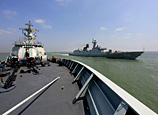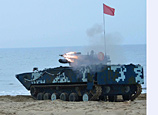
BEIJING, May 23 (Xinhua) -- Rays of summer sun stream through the window of Guo Chuan's cozy study in Beijing in early May, casting light on a white model sailboat that alludes to the master's passion.
As Guo, a stocky middle-aged man casually outfitted in a gray T-shirt and black running shorts, rests in a white leather armchair, only the skin peeling from his knees and feet are evidence that he recently completed a legendary voyage.
From Nov. 18, 2012 to April 5, 2013, the 48-year-old completed a solo around-the-world odyssey aboard a Class 40 yacht. His 138-day journey started in Qingdao, a coastal city in northeast China's Shandong Province. From there, he sailed across the Pacific Ocean and down to Cape Horn off the coast of South America before making his way into the Atlantic Ocean and back to Qingdao. His 21,600-nautical mile (40,000-kilometer) journey took him through the most dangerous waters on the planet and set a world record for solo non-stop circumnavigation in a Class 40 yacht.
His boat, the Qingdao, arrived back in the city of Qingdao on the morning of April 5. Though only several meters away from the pontoon, Guo couldn't wait to jump into the sea and swim to his wife and two sons.
Kneeling in front of his family, he burst into tears of pride, excitement and gratitude.
About a month has passed since he ended his adventure through biting cold, scorching heat and other types of severe oceanic and climate extremes.
"All the adversities flashing back are like surreal dreams," he says calmly, listening to his wife teach their younger son to speak in the next room.
Guo was the first Chinese to traverse the Atlantic Ocean by himself and the first Chinese to complete the around-the-world Volvo Ocean Race, a nine-month race from October 2008 to June 2009.
Summarizing his accomplishments, he simply says, "I just follow my heart."
"IT'S ADDICTIVE"
Fifteen years ago, it would have been difficult to imagine Guo as a sport sailor.
Born in Qingdao, Shandong Province, in 1965, Guo once dreamed of being a scientist. He holds a master's degree in aircraft control from the Beijing University of Aeronautics and Astronautics and a master's degree from the Guanghua School of Management at Peking University, one of China's top business schools.
In the 1990s, Guo managed a branch company of China Great Wall Industry Corporation, the country's only commercial organization that provides satellites and commercial launch services and carries out international space cooperation.
His life changed during a trip to Hong Kong in 1998, when he boarded a friend's yacht for a day of sailing.
"The feeling of braving the winds and waves is like... I was free from all boundaries," he reminisces. "Sailing creates an adrenaline rush in me, especially when I conquer a storm with logical thinking and efficient handling. It's addictive."
In 2000, Guo resigned as deputy general manager of the company and devoted himself to sailing.
"I found that I longed for challenge and adventure. My job was promising, but I knew that I wanted something else," says Guo, who began training as a professional sailor in France in 2004.
As China's first professional ocean sailor, Guo participated in the Clipper Round the World Yacht Race in 2006 and took part in the Mini Transat race in 2011, successfully sailing solo across the Atlantic Ocean in a 6.5-meter mini yacht.
Sailing has been popular as a sport in Western countries for over 400 years, but hadn't been introduced to China until the 1990s, as Chinese incomes have grown and the country's two applications to host the Olympic Games brought in more Western sports.
"But it is developing very fast," Guo says, pointing out that the amount of yachting clubs in China has ballooned in the past decade.
Voiles & Voiliers, a leading professional sailing magazine, pointed out in January that Guo's transition from engineer to one of China's top sailors shows that the sport is making waves in China.
RIDING OUT THE STORM
Sailing has been Guo Chuan's life over the past decade, but it hasn't always been easy. "It has made me suffer from loneliness, desperation and a nervous breakdown, but I never gave up."
After dealing with equipment failures, barrages of fishing nets, fast-moving tropical storms and a no-wind situation during the first two months of his around-the-world voyage, low temperatures combined with high humidity posed new challenges as Guo approached the Strait of Magellan south of mainland South America in January.
"Wind from the South Pole was bone-rattling cold, and the sun hid behind clouds for weeks, leaving the whole world dreary and lifeless," Guo recalls. "I reached Cape Horn in a state of desperation on the night of January 18."
Notorious for treacherous winds and huge waves, Cape Horn, located at the southern tip of South America, has been the site of 500 shipwrecks and the deaths of more than 20,000 sailors throughout history. It is sometimes called "the Mountain Everest of sailing."
"That night was my weakest time of the whole voyage," Guo says.

















 Post office demolished by 'mistake' overnight
Post office demolished by 'mistake' overnight


![]()
